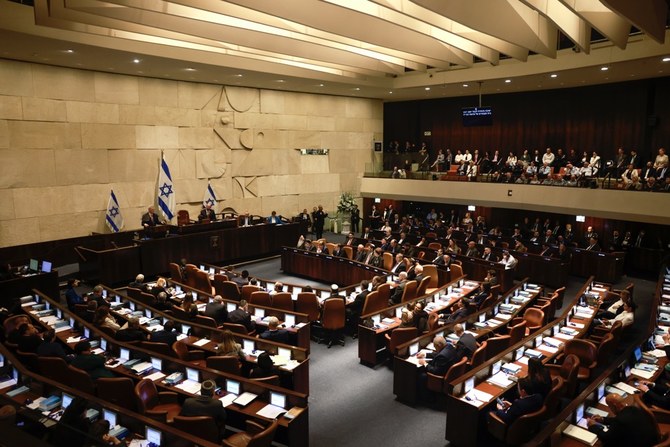
Tel Aviv (AFP) – An estimated 150,000 people marched Thursday in Israel's coastal metropolis Tel Aviv for the Middle East's largest Pride parade, amid protests against the presence of anti-LGBTQ ministers in the government.

© JACK GUEZ / AFP
Revellers in colourful outfits danced on and around floats playing music on the seafront promenade of Israel's cultural and financial hub, seen as a rare oasis of LGBTQ tolerance in the region, AFP journalists said.
"It's a huge celebration and I want to be here today to support the LGBTQ+ community, I really want to be with you," 26-year-old Elise Zhdanova told AFP.
The annual march was held under the new extreme-right government of Prime Minister Benjamin Netanyahu, which includes multiple cabinet members who have expressed homophobic views in the past and coalition partners with a long record of voting against LGBTQ rights.
Many Israelis fear the government's controversial plans for a legal reform curbing Supreme Court powers could remove safeguards and call into question acquired rights.
Yael Ben Yosef said her participation was important because of the domestic political situation.
Revellers in colourful outfits danced on and around floats playing music on the seafront promenade of Israel's cultural and financial hub, seen as a rare oasis of LGBTQ tolerance in the region, AFP journalists said.
"It's a huge celebration and I want to be here today to support the LGBTQ+ community, I really want to be with you," 26-year-old Elise Zhdanova told AFP.
The annual march was held under the new extreme-right government of Prime Minister Benjamin Netanyahu, which includes multiple cabinet members who have expressed homophobic views in the past and coalition partners with a long record of voting against LGBTQ rights.
Many Israelis fear the government's controversial plans for a legal reform curbing Supreme Court powers could remove safeguards and call into question acquired rights.
Yael Ben Yosef said her participation was important because of the domestic political situation.
"I think we have to show we're here, that we're not afraid and that they won't put us in the closet," the 22-year-old psychobiology student told AFP.
"We will keep on fighting until we'll be completely equal," she said.
The chant "Democracy!", used at demonstrations against the government and its legal reform plans for 23 consecutive weeks, was also heard at the Thursday parade, AFP reporters said.
Despite the current government's conservative nature, Israel is more progressive than many of its Middle East neighbours, with gay marriages conducted abroad recognised by the state and an openly gay speaker of parliament.
A spokesman for the Tel Aviv municipality said 150,000 people participated in Thursday's march, among them thousands of foreigners.
One of them was 27-year-old Leon Mueller from Frankfurt, who said he and his friend visited Israel "especially for the Pride" march.
"We heard a lot about it, we want to feel the Israeli Pride's spirit," he told AFP.
© 2023 AFP

Thousands march in Jerusalem Pride parade under Israel’s far-right government
By —Isaac Scharf, Associated Press
By — Tia Goldenberg, Associated Press
JERUSALEM (AP) — Thousands of people on Thursday marched in Jerusalem’s Pride parade — an annual event that took place for the first time under Israel’s new far-right government, which is stacked with openly homophobic members.
The march in the conservative city is always tense and tightly secured by police, and has been wracked by violence in the past. But this year, Israel finds itself deeply riven over a contentious government plan to overhaul the judiciary. The plan has torn open longstanding societal divisions between those who want to preserve Israel’s liberal values and those who seek to shift it toward more religious conservatism.
Jerusalem’s march is typically more subdued than the one in gay-friendly Tel Aviv, where tens of thousands of revelers pour into the streets for a massive, multicolored party. But Thursday’s parade, amid tight security, drew bigger crowds than usual in a show of force against the government and its plan to reshape the legal system.
“There isn’t one struggle in Israel for democracy, and another one for LGBTQ+ rights,” opposition leader Yair Lapid said in a speech to the crowd. “It’s the same struggle, against the same enemies, in the name of the same values.”
Other opposition politicians and the U.S. ambassador to Israel, Tom Nides, joined Thursday’s march. “I don’t find this controversial one way or the other,” Nides said. “This is about the rights and human rights, and this is what brings America and Israel together.”
Prime Minister Benjamin Netanyahu’s government is made up of ultranationalist and ultra-religious parties who openly oppose homosexuality, although the Israeli leader has promised to protect LGBTQ+ rights and a member of his party who is gay is the Knesset speaker.
The country’s Finance Minister Bezalel Smotrich has in the past declared he was a “proud homophobe.” Before entering politics, National Security Minister Itamar Ben-Gvir, who now oversees the police, was a fixture at Pride parades, joining a group of protesters who oppose the march. Avi Maoz, a deputy minister with authorities over some educational content, has said he wanted the legality of the Jerusalem Pride parade examined.
Ben-Gvir said Wednesday there would be a “massive” police presence guarding the marchers and that he supported the freedom of expression manifested by the parade. Israeli police said more than 2,000 officers were deployed along the parade route.
“It will be the police’s duty to protect, guard and ensure that even if the minister disagrees with the parade, the safety of the marchers is above all else,” Ben-Gvir said.
At one point during the parade, Ben-Gvir was jeered with chants of “shame” as he walked on the sidelines for what he said was a visit to monitor security.
Hagar Bonne, of Jerusalem, called the march a “happy occasion” but also said it was the “antithesis” to the national climate.
“There are people who are very much homophobic and very much transphobic who are in the government today and hold positions of power and budget and are working against us actually right now,” she said.
People carried a flag that read: “There is no pride without democracy.”
WATCH: The state-level battles brewing in America over LGBTQ+ rights
Like other years, a small group of anti-LGBTQ+ activists attended Thursday’s parade. At the parade in 2015, an ultra-Orthodox Israeli man stabbed 16-year-old Shira Banki to death and wounded several others.
Israel is generally tolerant toward the LGBTQ+ community, a rarity in the conservative Middle East, where homosexuality is widely considered taboo and is outlawed in some places. Members of the LGBTQ+ community serve openly in Israel’s military and parliament, and many popular artists and entertainers are openly gay.
Yet activists say there is a long road toward full equality. Jewish ultra-Orthodox parties, which wield significant influence over matters of religion and state, oppose homosexuality as a violation of religious law, as do other religious groups in Israel.
The conservative make-up of Netanyahu’s government sparked new fears in the LGBTQ+ community, which had seen gains under the previous, short-lived administration led by Netanyahu’s rivals. Those fears were exacerbated when the government pushed ahead on its plan to overhaul the judiciary, a plan that was put on hold in March after a burst of spontaneous mass protests.
The plan would weaken the judiciary and limit judicial oversight on laws and government decisions, what critics say poses a direct threat to civil rights and the rights of minorities and marginalized groups.
Protests have continued even though the government and opposition are in talks to find a compromise on the plan and demonstrators are expected to show up in Jerusalem to lend their support to the community.
The government says the judicial plan is meant to rein in what it says is an overly interventionist Supreme Court and restore power to elected legislators. Critics say it will grant the government unrestrained power and upend the country’s system of checks and balances.
Goldenberg reported from Tel Aviv, Israel.
The march in the conservative city is always tense and tightly secured by police, and has been wracked by violence in the past. But this year, Israel finds itself deeply riven over a contentious government plan to overhaul the judiciary. The plan has torn open longstanding societal divisions between those who want to preserve Israel’s liberal values and those who seek to shift it toward more religious conservatism.
Jerusalem’s march is typically more subdued than the one in gay-friendly Tel Aviv, where tens of thousands of revelers pour into the streets for a massive, multicolored party. But Thursday’s parade, amid tight security, drew bigger crowds than usual in a show of force against the government and its plan to reshape the legal system.
“There isn’t one struggle in Israel for democracy, and another one for LGBTQ+ rights,” opposition leader Yair Lapid said in a speech to the crowd. “It’s the same struggle, against the same enemies, in the name of the same values.”
Other opposition politicians and the U.S. ambassador to Israel, Tom Nides, joined Thursday’s march. “I don’t find this controversial one way or the other,” Nides said. “This is about the rights and human rights, and this is what brings America and Israel together.”
Prime Minister Benjamin Netanyahu’s government is made up of ultranationalist and ultra-religious parties who openly oppose homosexuality, although the Israeli leader has promised to protect LGBTQ+ rights and a member of his party who is gay is the Knesset speaker.
The country’s Finance Minister Bezalel Smotrich has in the past declared he was a “proud homophobe.” Before entering politics, National Security Minister Itamar Ben-Gvir, who now oversees the police, was a fixture at Pride parades, joining a group of protesters who oppose the march. Avi Maoz, a deputy minister with authorities over some educational content, has said he wanted the legality of the Jerusalem Pride parade examined.
Ben-Gvir said Wednesday there would be a “massive” police presence guarding the marchers and that he supported the freedom of expression manifested by the parade. Israeli police said more than 2,000 officers were deployed along the parade route.
“It will be the police’s duty to protect, guard and ensure that even if the minister disagrees with the parade, the safety of the marchers is above all else,” Ben-Gvir said.
At one point during the parade, Ben-Gvir was jeered with chants of “shame” as he walked on the sidelines for what he said was a visit to monitor security.
Hagar Bonne, of Jerusalem, called the march a “happy occasion” but also said it was the “antithesis” to the national climate.
“There are people who are very much homophobic and very much transphobic who are in the government today and hold positions of power and budget and are working against us actually right now,” she said.
People carried a flag that read: “There is no pride without democracy.”
WATCH: The state-level battles brewing in America over LGBTQ+ rights
Like other years, a small group of anti-LGBTQ+ activists attended Thursday’s parade. At the parade in 2015, an ultra-Orthodox Israeli man stabbed 16-year-old Shira Banki to death and wounded several others.
Israel is generally tolerant toward the LGBTQ+ community, a rarity in the conservative Middle East, where homosexuality is widely considered taboo and is outlawed in some places. Members of the LGBTQ+ community serve openly in Israel’s military and parliament, and many popular artists and entertainers are openly gay.
Yet activists say there is a long road toward full equality. Jewish ultra-Orthodox parties, which wield significant influence over matters of religion and state, oppose homosexuality as a violation of religious law, as do other religious groups in Israel.
The conservative make-up of Netanyahu’s government sparked new fears in the LGBTQ+ community, which had seen gains under the previous, short-lived administration led by Netanyahu’s rivals. Those fears were exacerbated when the government pushed ahead on its plan to overhaul the judiciary, a plan that was put on hold in March after a burst of spontaneous mass protests.
The plan would weaken the judiciary and limit judicial oversight on laws and government decisions, what critics say poses a direct threat to civil rights and the rights of minorities and marginalized groups.
Protests have continued even though the government and opposition are in talks to find a compromise on the plan and demonstrators are expected to show up in Jerusalem to lend their support to the community.
The government says the judicial plan is meant to rein in what it says is an overly interventionist Supreme Court and restore power to elected legislators. Critics say it will grant the government unrestrained power and upend the country’s system of checks and balances.
Goldenberg reported from Tel Aviv, Israel.






















